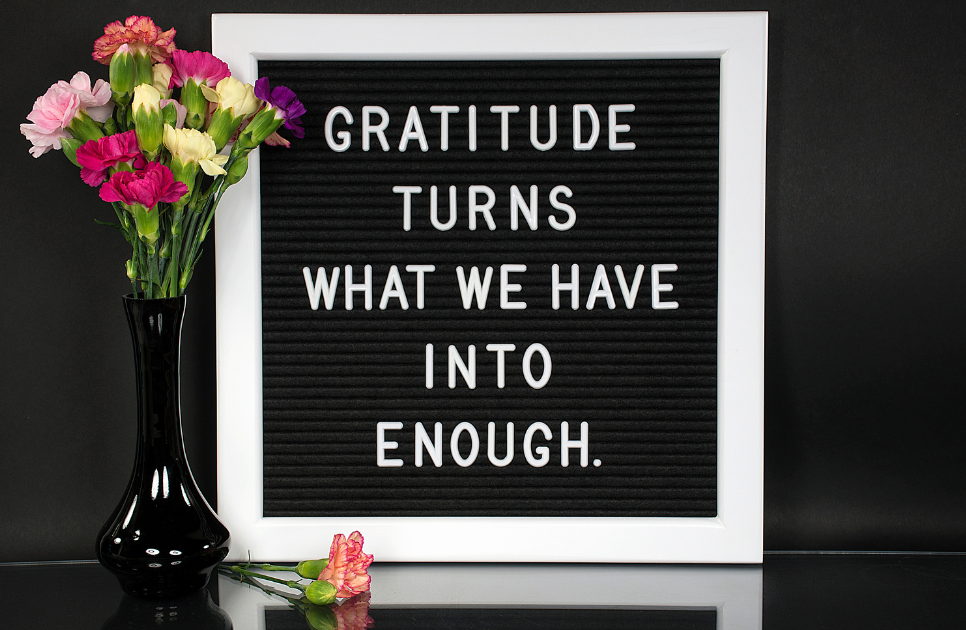In juggling the competing priorities of our daily lives, it’s easy to become caught up in the relentless pursuit of more.
More success, more possessions, more recognition. Yet, amid this endless chase, we often overlook the power of gratitude. It is a simple concept that has the potential to improve our quality of life significantly.
Gratitude is not merely a polite response to receiving a gift or a kind gesture; it’s a life-changing practice that can shape our perspectives, improve our mental and emotional well-being, and deepen our relationships.
In this article, we’ll explore the power of gratitude, diving into its science, the tangible benefits of practicing gratitude, and ways in which it can be cultivated to create a more meaningful existence.
Let’s get started.
The Power of Gratitude Defined

Gratitude is a human emotion and state of mind characterized by the appreciation and recognition of the positive aspects of our lives.
It is the warm and heartfelt acknowledgment of the blessings, kindness, and gifts we receive from others, a higher power, or simply from within ourselves.
Gratitude isn’t just about saying “thank you” for favors or material possessions; it’s an attitude of thankfulness that extends to the intangible, such as the love of family and friends, good health, opportunities, and the beauty of the world around us.
This concept goes beyond mere politeness; it’s about cultivating an awareness of everything we have, even in the face of challenges or difficulties. Gratitude encourages us to shift our focus from what we lack to what we have, fostering contentment and fulfillment.
The Science Behind Gratitude

The science behind gratitude is a field of study that delves into the psychological, neurological, and physiological aspects of this positive emotion.
Researchers have uncovered compelling evidence demonstrating how practicing gratitude can have profound mental and physical effects.
From a psychological perspective, gratitude is closely associated with increased happiness and satisfaction.
When individuals regularly engage in practices like keeping gratitude journals, where they record things they’re thankful for, they experience a boost in their mood and overall sense of well-being.
Psychologists suggest that gratitude shifts our focus from what we lack to what we have, fostering a more positive outlook.
Neuroscientists have explored the brain’s response to gratitude, revealing that when we express thankfulness, areas of the brain associated with reward and pleasure light up.
Additionally, researchers have found that gratitude can directly impact our bodies. It has been linked to lower stress levels, reduced inflammation, and improved sleep quality.
Counting one’s blessings triggers a relaxation response in the body, leading to several positive effects.
In essence, the science of gratitude provides concrete evidence that this simple practice can yield significant benefits for our mental, emotional, and physical health.
It underscores the idea that gratitude is not merely a subjective feeling but a powerful tool for enhancing the quality of our lives.
Benefits of Practicing Gratitude

Whether you express gratitude for the people around you, the opportunities you’ve been given, or even the small everyday joys, this practice carries many benefits that should be further explored.
Here are some of the critical advantages that gratitude can help you achieve.
Improved Mental Health
As previously mentioned, one of the most significant benefits of practicing gratitude is its positive impact on mental health.
Studies have shown that people who regularly express gratitude tend to experience lower levels of stress and depression.
Focusing on the positive aspects of your life shifts your perspective away from what’s lacking and towards what you have, fostering a greater sense of contentment and appreciation.
Enhanced Emotional Resilience
Gratitude can act as a buffer against negative emotions and help you navigate challenging times with greater resilience.
You can find solace and strength even in adversity by acknowledging what you’re grateful for.
It’s like having an emotional toolbox that equips you to handle life’s ups and downs more effectively.
Stronger Relationships
Gratitude has the power to deepen your relationships with others. Expressing appreciation for the people in your inner circle makes them feel valued and loved and strengthens your bond.
This can lead to healthier and more fulfilling connections with friends, family, and colleagues.
Increased Happiness
Gratitude and happiness are intrinsically linked. When you take time to appreciate the positives, no matter how small, you will experience greater joy and satisfaction.
This happiness isn’t fleeting; it becomes a consistent part of your daily life.
Physical Health Benefits
As we’ve already learned but cannot overstate, gratitude has also been associated with physical health benefits.
Research suggests that individuals who practice gratitude tend to have lower blood pressure, improved sleep quality, and stronger immune systems.
It’s a testament to the mind-body connection and the far-reaching impact of positive emotions.
Motivation & Goal Achievement
Gratitude can be a powerful motivator. When you recognize the support and resources you have, it can inspire you to work toward your goals with a renewed sense of determination.
Grateful individuals often find themselves more focused and driven to achieve their dreams.
Acts of Kindness & Generosity
Gratitude has a ripple effect. We are more likely to pay it forward when we feel grateful for the kindness shown.
This creates a cycle of generosity and goodwill that can benefit not only ourselves but also our communities and the world at large.
Incorporating gratitude daily doesn’t require grand gestures or dramatic changes. It can be as simple as keeping a gratitude journal, expressing thanks to the people who matter to us, or pausing to appreciate the beauty of nature.
The benefits of gratitude are accessible to everyone, and by making this practice a regular part of your life, you can realize its transformative power.
9 Ways to Foster Gratitude in Daily Life

While showing gratitude has its many benefits, it’s not something that magically happens; it’s a skill you can develop through consistent practice.
By consciously incorporating a daily gratitude practice into your routine, you can experience its positive effects.
Here are some simple yet effective ways to cultivate gratitude in your daily life:
Keep a Gratitude Journal
Maintaining a gratitude journal is one of the most popular methods to foster gratitude.
Each day, take a few minutes to jot down three to five things you’re grateful for. These can range from significant events to the small joys of the day.
Regularly reflecting on these positive aspects can shift your mindset toward the things you have to be grateful for.
Start and End the Day with Gratitude
Begin your mornings by setting an intention for the day, focusing on gratitude. Before getting out of bed, think of three things you’re thankful for.
Similarly, as you wind down at night, reflect on the positive experiences of the day. This practice helps frame your day from a positive point of view.
Express Thanks
Don’t keep your gratitude to yourself; express it. Tell people you appreciate them and why.
Write thank-you notes or send texts or emails of appreciation. Expressing gratitude strengthens your relationships and reinforces the practice in your own life.
Mindful Moments
Throughout the day, pause for mindful moments. Take a deep breath and appreciate the present moment.
Notice the beauty of nature, the warmth of the sun, or the smiles of strangers. Mindfulness helps you become more aware of the simple pleasures in life.
Volunteer & Give Back
Engaging in charitable acts and service can foster gratitude. Volunteering allows you to see the challenges others face, reminding you of your blessings.
Giving back is not only a way to express gratitude but also a way to generate it.
Reflect on Challenges
Gratitude doesn’t mean ignoring life’s difficulties but finding the lessons and opportunities to grow from them.
Reflect on past challenges and identify the positive outcomes or personal growth that resulted from those experiences.
Limit Negative Inputs
Be mindful of the information you consume. Limit exposure to negativity, whether it’s through the news, social media, or conversations that focus on complaints.
Surround yourself with positivity to make space for appreciation.
Set Reminders
Use visual cues or reminders to prompt gratitude throughout the day.
You can set alarms on your phone, place sticky notes with gratitude prompts on your desk, or use gratitude apps to keep the practice consistent.
Share Gratitude with Loved Ones
Make gratitude a family or community practice. Share your daily gratitude with loved ones at meals or bedtime. Encourage others to join you on this journey of appreciation.
Cultivating gratitude is a journey, not a destination. It takes time and commitment, but the rewards are immense.
As you integrate these practices into your daily life, you’ll find that gratitude becomes a natural and integral part of your mindset, leading to a happier heart and a more fulfilling life.
Final Thoughts

As we conclude our exploration of the power of gratitude, one thing becomes abundantly clear.
This simple yet profound practice has the potential to transform our lives in ways that are both deeply personal and far-reaching.
In our fast-paced, often chaotic lives, it’s too easy to overlook the everyday blessings surrounding us. Yet, gratitude reminds us to pause, reflect, and appreciate the beauty in both the grand and the mundane.
It encourages us to express thanks not only for the gifts we receive but for life itself. This shift in perspective can lead to greater contentment and a more profound sense of purpose.
Practicing gratitude should not be considered a one-time action but a lifelong journey. It’s a practice that invites us to continually seek the silver linings, even in the darkest clouds.
As you navigate your gratitude journey, remember it’s not about striving for perfection or denying your challenges. It’s about finding balance and perspective, recognizing that in the big picture of life, both the ups and the downs contribute to the richness of the experience.
So, take a moment right now to reflect on something you’re grateful for. It could be for your health and well-being, the support of a loved one, a moment of serenity, or the simple pleasures that brighten your day.
Embrace the power of gratitude, cultivate it in your daily life, and watch as it unfolds its magic, filling your world with an immeasurable sense of abundance and positivity.





